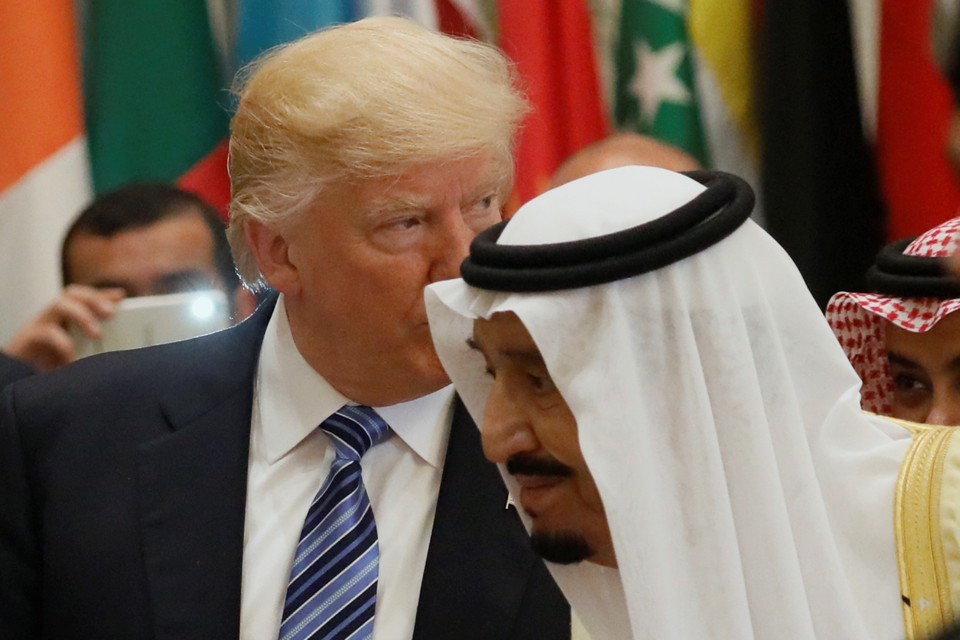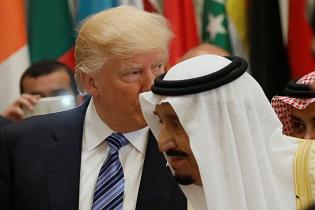Trump’s visit and split in divided Islamic world
The fallout of the very first official trip to Mideast by the US president Trump is disastrous for Arab nations as Saudi Arabia, emboldened by Trumps’ meeting with its king Salman in Riyadh , has, along with fellow Arab nations, kicked Qatar from their powerful club.
Islamic world, already badly and hopelessly divided as per the designs of anti-Islamic world is further split now with Arab nation Qatar being cut off by other Arab nations. This has become a big victory for all global anti-Islamic forces led by USA-UK terror twins within NATO.
Interestingly, the attacks on Muslims and Muslim world as part of anti-Islamism drive following the Sept-11 hoax enacted with perfection could help Muslims and Islamic world to comprehend the danger to religion and their own existence in the world dominated by enemies of Islam.
Success of anti-Islamic world and their fanatic media is that the Arab world, instead of uniting firmly against the threat to them and Islam, has begun a serious quarrel among themselves, presenting an apologetic disposition to the world. News has it that Saudi Arabia, Egypt, the United Arab Emirates and Bahrain have severed their ties with Qatar on June 05, accusing it of supporting "terrorism” and opening up the worst rift in years among some of the most powerful states in the Arab world.
Gulf Arab states and Egypt have already long resented Qatar's support for Islamists, especially the Muslim Brotherhood which they regard as a dangerous political enemy. The coordinated move, with Yemen and Libya's eastern-based government joining in later, created a dramatic rift among the Arab nations, many of which are in OPEC.
Announcing the closure of transport ties with Qatar, the three Gulf states gave Qatari visitors and residents two weeks to leave. Qatar was also expelled from the Saudi-led coalition fighting in Yemen.
Oil giant Saudi Arabia accused Qatar of backing militant groups -- some backed by regional arch-rival Iran -- and broadcasting their ideology, an apparent reference to Qatar's influential state-owned satellite channel al Jazeera. "(Qatar) embraces multiple terrorist and sectarian groups aimed at disturbing stability in the region, including the Muslim Brotherhood, ISIS (Islamic State) and al-Qaeda, and promotes the message and schemes of these groups through their media constantly," Saudi state news agency SPA said.
It accused Qatar of supporting what it described as Iranian-backed militants in its restive and largely Shi'ite Muslim-populated Eastern region of Qatif and in Bahrain. Qatar said it was facing a campaign aimed at weakening it, denying it was interfering in the affairs of other countries. "The campaign of incitement is based on lies that had reached the level of complete fabrications," the Qatari foreign ministry said in a statement.
Iran saw America pulling the strings. "What is happening is the preliminary result of the sword dance," Hamid Aboutalebi, deputy chief of staff of Iran's President Hassan Rouhani, tweeted in a reference to Trump's recent visit to Saudi Arabia.
Iran -- long at odds with Saudi Arabia and a behind-the-scenes target of the move -- immediately blamed U.S. President Donald Trump for setting the stage during his recent trip to Riyadh.
President Trump and other US officials participated in a traditional sword dance during the trip in which he called on Muslim countries to stand united against Islamist extremists and singled out Iran as a key source of funding and support for militant groups.
US Secretary of State Rex Tillerson told reporters in Sydney that the spat would not affect the fight against Islamist militants and that Washington has encouraged its Gulf allies to resolve their differences.
A split between Doha and its closest allies can have repercussions around the Middle East, where Gulf States have used their financial and political power to influence events in Libya, Egypt, Syria, Iraq and Yemen. The economic fallout loomed immediately, as Abu Dhabi's state-owned Ethihad Airways, Dubai's Emirates Airline and budget carrier Flydubai said they would suspend all flights to and from Doha from Tuesday morning until further notice.
Qatar Airways said on its official website it had suspended all flights to Saudi Arabia. Qatar's stock market index sank 7.5 percent with some of the market's top blue chips hardest hit. The measures are more severe than during a previous eight-month rift in 2014, when Saudi Arabia, Bahrain and the UAE withdrew their ambassadors from Doha, again alleging Qatari support for militant groups. At that time, travel links were maintained and Qataris were not expelled.
The diplomatic broadside threatens the international prestige of Qatar, which hosts a large U.S. military base and is set to host the 2022 World Cup. It has for years presented itself as a mediator and power broker for the region's many disputes. Kristian Ulrichsen, a Gulf expert at the US-based Baker Institute, said if Qatar's land borders and air space were closed for any length of time "it would wreak havoc on the timeline and delivery" of the World Cup. "It seems that the Saudis and Emiratis feel emboldened by the alignment of their regional interests - toward Iran and Islamism - with the Trump administration," Ulrichsen said. "(They) have decided to deal with Qatar's alternative approach on the assumption that they will have the (Trump) administration's backing."
Qatar used its media and political clout to support long-repressed Islamists during the 2011 pro-democracy "Arab Spring" uprisings in several Arab countries. Muslim Brotherhood groups allied to Doha are now mostly on the back foot in the region, especially after a 2013 military takeover in Egypt ousted the elected Islamist president. The former army chief and now president, Abdel Fattah al-Sisi, along with the new government's allies in Saudi Arabia and the UAE, blacklist the Brotherhood as a terrorist organization.
Egypt, the Arab world's most populous nation, said on its state news agency that Qatar's policy "threatens Arab national security and sows the seeds of strife and division within Arab societies according to a deliberate plan aimed at the unity and interests of the Arab nation."
Oil prices rose after the moves against Qatar, which is the biggest supplier of liquefied natural gas (LNG) and a major seller of condensate - a low-density liquid fuel and refining product derived from natural gas.
Do the Arab rulers think the western world would appreciate their gestures in their favor and cooperate with them fight anti-Islamism and Islamophobia percolated into world polity infrastructure?
Instead of wasting their resources on buying more and more terror goods at a very high cost from Western nations, the Arab nektons would do better by helping the poor Muslims globally and poor Muslims nations.
That would take the Arab world and Islam to greater heights. The enemies of Islam would think of quitting their anti-Islamic tirades.
Western world wants resources of energy rich Arab nations and money from other Muslim nations as service charges.
The split in Arab world is just the begin of the trouble in store for them and what is going to follow from here could be even worse.
Comments
There are 0 comments on this post













